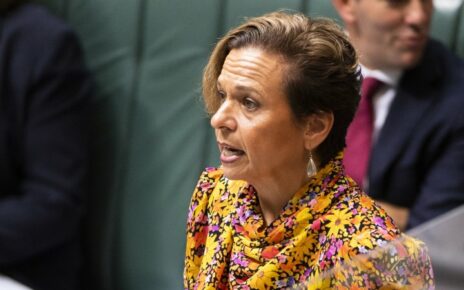Key points
- The Ombudsman reopened the investigation after a referral from the upper house.
- Deborah Glass in 2018 said the misuse of $380,000 in public money was wrong.
- She said arrests were a mistake and there was no reason to use more resources.
The police decision to arrest Labor Party campaigners in the lead-up to the 2018 election was a mistake, which helped to spin a perception that wrongdoing in the so-called red shirts affair had gone unpunished, Ombudsman Deborah Glass has found.
Glass said on Thursday there was no justification to use more public resources investigating red shirts, but such scandals would be repeated until genuine reforms were made in Victoria to strengthen integrity.
Victorian Ombudsman Deborah Glass is pictured in December last year.Credit:Chris Hopkins
The Ombudsman has handed down her second investigation into the scandal, which she described as “artifice”, in which Labor misused almost $400,000 worth of public money for campaign purposes.
The red shirts scandal refers to a scheme used in the 2014 election when campaign organisers were employed as casual electorate officers. The staff, who wore red Labor T-shirts, spent most of their working hours campaigning in marginal seats in a misuse of parliament’s budget.
In her initial report tabled in March 2018, Glass said the scheme was wrong and found 21 MPs had breached parliament’s members’ guide. Labor repaid more than $387,000 as a result.
But the Ombudsman said at the time there was no evidence the conduct met the criminal threshold of corruption, and on Thursday said no new evidence had come to light to change that or justify using more public resources.
“Is there anything else to investigate? The short answer is no,” Glass said in her second report, tabled in the Victorian Parliament on Thursday.
“It is time to end this debate. I cannot, of course, rule out that further evidence may yet come to light, but with the passage of time and difficulty in proof I am not prepared to spend further public resources on these matters.”
Victoria Police initially decided against taking action, after finding no evidence of corruption, but started a new investigation in 2018 following a request from the opposition.
Months later, in August 2018, police arrested 17 former field organisers in early morning raids three months out from the state election.
Glass said the arrests seemed to create a public expectation that members of Parliament would also be arrested, and a public belief they must have been treated leniently.
“But in my view, the high-profile arrests of 17 people some four years after the events for which they were being questioned, was a mistake,” she said.
Nobody was charged, and no further arrests were made.
In response to a draft version of the report, Victoria Police said investigators formed a reasonable belief that an indictable offence had been committed. “Five briefs of evidence were prepared for consideration for prosecution as a result of the arrests.”
The Ombudsman was required to reopen the red shirts investigation after the Legislative Council, led by ousted Labor powerbroker Adem Somyurek and with the opposition’s support, referred the scandal for investigation in February.
Adem Somyurek addresses the media at the Victorian Parliament last week.Credit:Paul Jeffers
Premier Daniel Andrews, who has acknowledged that he was aware staff were engaging in campaign work when he was opposition leader, was not one of the 23 MPs connected to red shirts. Glass found no evidence he was aware the scheme was an artifice or played any role facilitating it, despite unsupported claims by Somyurek.
On Tuesday, former Victorian treasurer John Lenders announced he will step down from the Labor Party’s campaign committee preparing for the November 26 election.
Ombudsman Deborah Glass in 2018 said Lenders held the “greatest share of culpability” for the red shirts scheme.
He told The Age he did not want to be a distraction for the party ahead of the state election.
Glass has opened a further review into the politicisation of the public service, exposed in an Age investigation, which is not expected to be finalised this year.
A separate inquiry, Operation Watts, handed down by the Ombudsman and the Independent Broad-based Anti-corruption Commission last week, outlined a “catalogue of unethical and inappropriate behaviour” inside Victorian Labor.
The premier, who apologised for the party’s rotten culture, last week said he would seek to establish a parliamentary ethics committee to enforce beefed-up codes of conduct in response.
Operation Watts followed an investigation by The Age and 60 Minutes that exposed Somyurek’s branch-stacking operation. The inquiry made adverse findings against him and another former minister, Marlene Kairouz, but stopped short of referring them for criminal charges.
Glass said Operation Watts and the 2018 red shirts report exposed weaknesses in the Victorian parliamentary integrity model and the absence of an effective framework to enforce standards.
She recommended in 2018 an investigative agency be established and said Operation Watts showed how insufficient the reforms had been.
“Instead, we have seen further allegations of misuse of public funds,” Glass said.
“That these issues continue to loom large in the public consciousness as an example of unpunished wrongdoing is a product of many factors, including the police operation in 2018. But it is also a product of the unsatisfactory state of the law in relation to the misuse of public funds, and an inadequate system for investigating and sanctioning MPs who break the rules.”
The Morning Edition newsletter is our guide to the day’s most important and interesting stories, analysis and insights. Sign up here.
Most Viewed in Politics
From our partners
Source: Read Full Article


